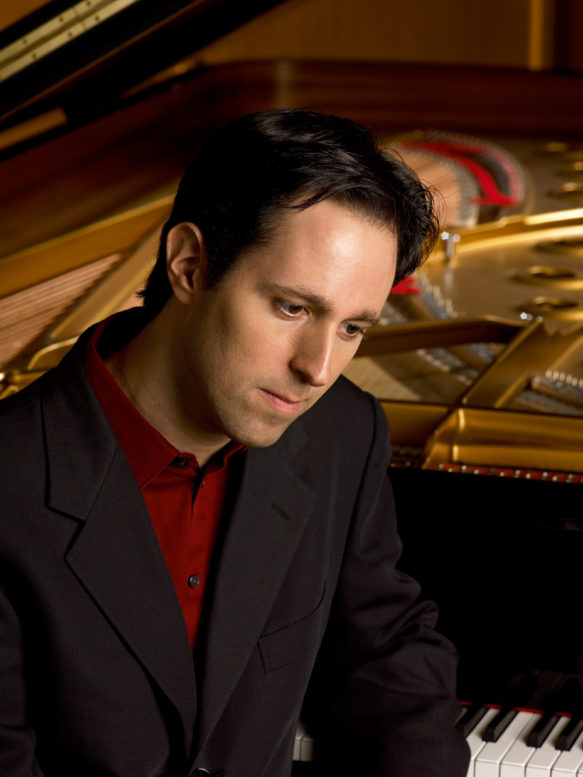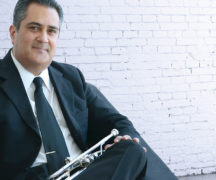By DAVID DUPONT
BG Independent News
Pianist Spencer Myer is no stranger to Bowling Green State University’s College of Musical Arts.
Growing up in North Ridgefield, he traveled to BGSU for a workshop with the Men’s Choir and a couple master classes with Jerome Rose.
When he returns next weekend guest artist for the David D. Dubois Piano Competition, he’ll be the one presenting the master class.
The master class will be Friday at 2:30 p.m. in Bryan Recital Hall in the Moore Musical Arts Center. Myer will present a recital in Kobacker Hall Saturday Feb. 13 at 8 p.m. Tickets are $10 for adults and $5 for children, and BGSU music majors are free with student ID. He will then serve on the jury for the finals of the piano competition on Sunday morning starting at 9 a.m.
Two of the pieces on his recital program may well be played by Dubois competitors.
Myer will open his Saturday concert with Mozart’s Sonata in G Major, which he said is common for students to play but often neglected by professionals. He’ll also perform Maurice Ravel’s “Jeux D’Eau.” A technically difficult piece that has been played in past Dubois events.
The centerpiece of his concert will be Robert Schumann’s “Fantasie.”
It’s been in his concert repertoire for two years. “I’ve just adored the piece for so long and how poignant it is. It’s been hard to let go of it.”
The piece “is so deep and so sincere. … It’s clearly a statement of love from Schumann to Clara. It has so many special moments.
“It’s a piece I’ve held on a pedestal for so long, and I waited to learn it until I was grown up. … That’s why I’ve held onto it for so long.”
Myer also will perform Ravel’s Sonatine and close with four rags by William Bolcom. Myer has recorded 16 of the contemporary composer’s rags – “they’re so inventive and clever.” That recording will be released later this year.
Myer said he strives for a balance of styles within a program. He also strives for a balance in his professional life.
He performs internationally as a soloist, but also frequently collaborates with other instrumentalists in chamber ensembles and with singers.
Myer credits his undergraduate education at Oberlin with his discovery of collaboration especially with vocalists.
Oberlin wasn’t his first choice of conservatories. He wanted to go to the Juilliard School in New York City. He auditioned at Oberlin because it was close to home and would be good practice. Despite its proximity, he said, he really didn’t know much about the school.
But he didn’t get into Juilliard. “It was the best thing that could have happened to me because Oberlin was an unforgettable place” that gave him a well-rounded education.
Undergraduates could blossom there without being overshadowed by graduate students, he said. “Juilliard for me was a much more appropriate place for me as a graduate student.”
He’s remained in New York, but his love of collaborative piano fostered at Oberlin has played an important part in his career.
“It forces you to listen in a different way,” he said of accompanying. “It allows you to explore different coloristic capabilities because you have to expand the lower end, the softer end, of the color spectrum to blend with somebody and to support them without overpowering them.”
For a pianist, working with a vocalist “teaches you how to sing and sustain… It’s so revealing and so educational. Even with an untrained singer you can learn so much about how an instrument can sustain.”
Myer said while he might envy the lifestyle of the “household names” in the music business, he’s happy to have a balanced career.
That allows him to set aside his solo recital pieces for a few weeks while he pursues teaching and musical collaborations. “So they always feel fresh when I come back to practicing them and go back on stage.”
Myer added, “That’s a great aspect of live performance. There is spontaneity. You always discover things.”
Globe trotting pianist Spencer Myer visits familiar ground in Bowling Green
 Spencer Myer will visit Bowling Green State University Feb. 12-14. (Photo by Roger Mastroianni via SpencerMyer.com)
Spencer Myer will visit Bowling Green State University Feb. 12-14. (Photo by Roger Mastroianni via SpencerMyer.com)




